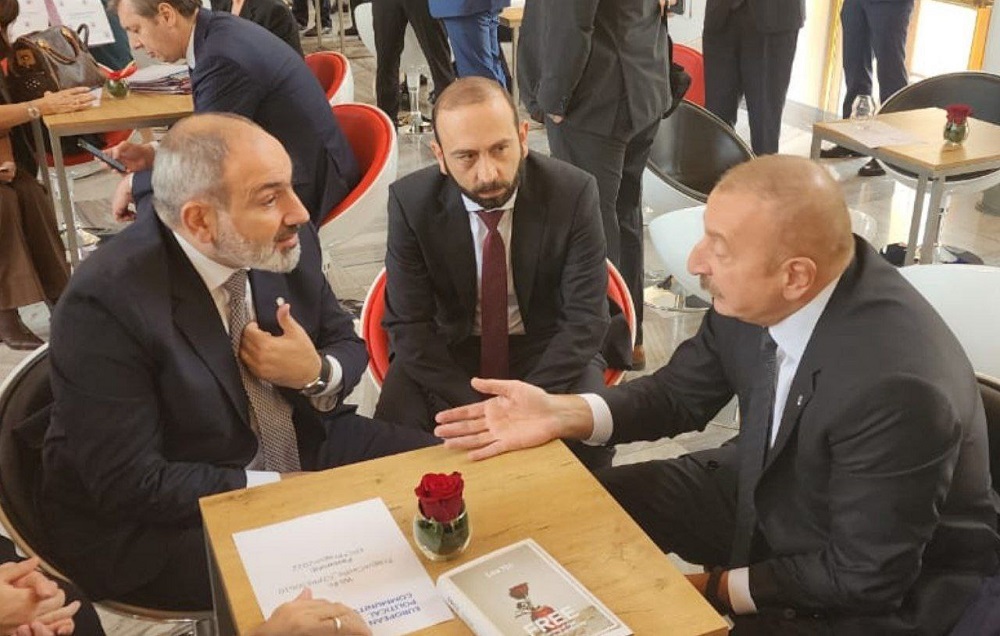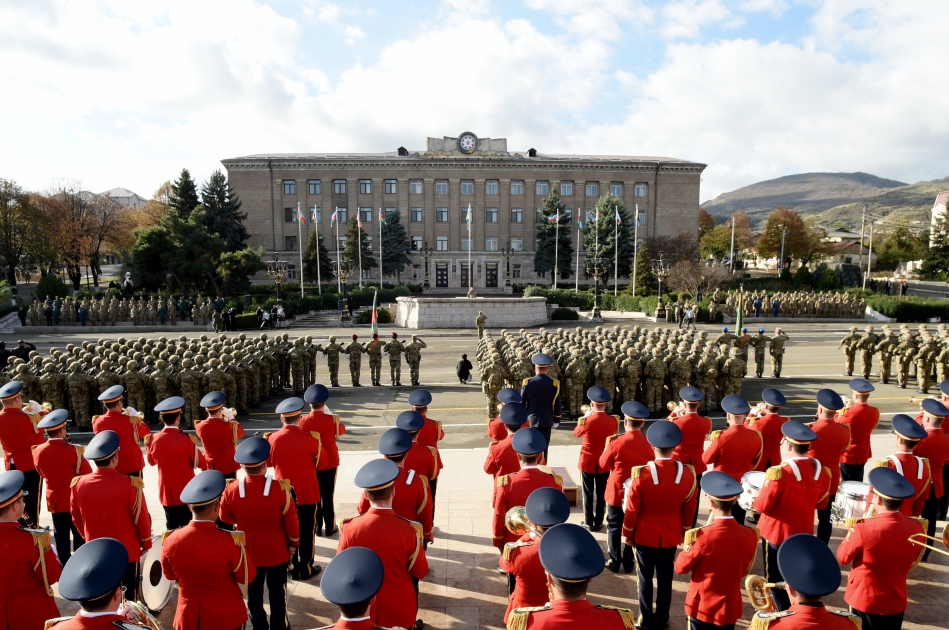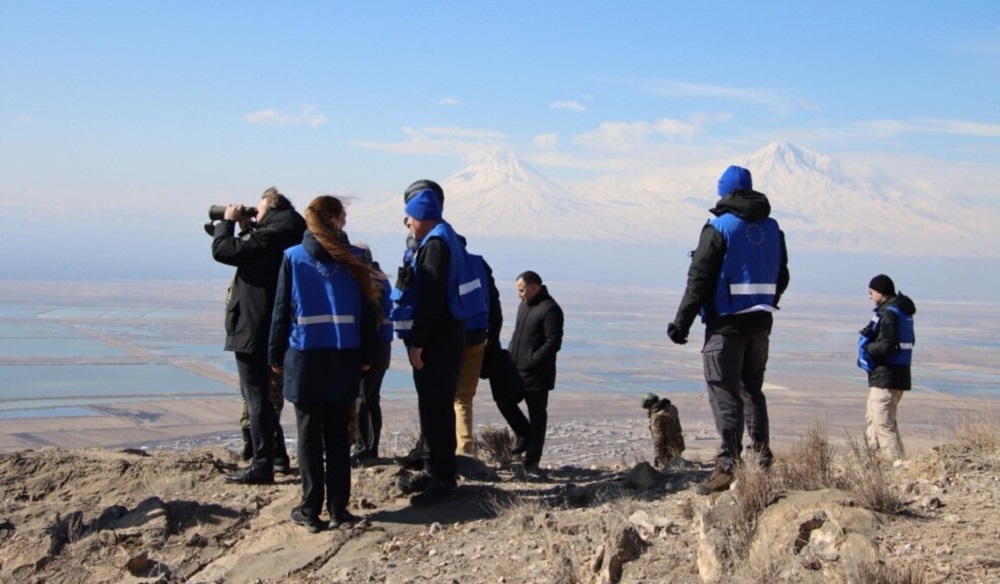European Commission recommends EU open accession negotiations with Ukraine#bne #bneEditorsPicks #EmergingMarkets #Ukraine #Russia #RussiaUkraineWar #sanctions https://t.co/Rp47RDHa1u pic.twitter.com/7YCtS0EDdB
— bne IntelliNews (@bneintellinews) November 9, 2023
Day: November 9, 2023
Israel Battles Hamas in Gaza City … Ilham Aliyev: “We do not need a new war” – Selected Articles And Tweets – The News And Times – 5:01 AM 11/9/2023 https://t.co/j6WtiY3BXS pic.twitter.com/JCwx839doR
— Michael Novakhov (@mikenov) November 9, 2023
Israel Battles Hamas in Gaza City … Ilham Aliyev: “We do not need a new war” – Selected Articles And Tweets – The News And Times – 5:01 AM 11/9/2023 https://t.co/j6WtiY3BXS
Houthis accused of car bomb attack targeting Yemen army chief
AL-MUKALLA: Yemeni government officials… pic.twitter.com/W7ihsJzE5k— Michael Novakhov (@mikenov) November 9, 2023
Israel Battles Hamas in Gaza City … Ilham Aliyev: “We do not need a new war” – Selected Articles And Tweets – The News And Times – 5:01 AM 11/9/2023 https://t.co/j6WtiY3BXS pic.twitter.com/U5jKNLWtQm
— Michael Novakhov (@mikenov) November 9, 2023
Israel Battles Hamas in Gaza City … Ilham Aliyev: “We do not need a new war” – Selected Articles And Tweets – The News And Times – 5:01 AM 11/9/2023 https://t.co/j6WtiY3BXS pic.twitter.com/nivKxJElEf
— Michael Novakhov (@mikenov) November 9, 2023
Israel Battles Hamas in Gaza City
Latest developments: Israeli forces battle Hamas fighters in Gaza City. IDF extended for an extra hour Wednesday its evacuation corridor for Palestinians to leave northern Gaza, as U.N. says 50,000 flee south. The Hamas-run health ministry in Gaza says the death toll from Israeli attacks has surpassed 10,500. G7 backs Israel’s right to self-defense, while calling for pauses in fighting to allow humanitarian aid to reach Palestinian civilians. Israeli forces battled Hamas militants Thursday in Gaza City as Palestinian civilians flee the area that is the focus of Israeli military operations following a deadly attack by Hamas last month. In addition to the ground fighting in the largest city in the Gaza Strip, Israeli forces have also been hitting the area with airstrikes. The fighting has prompted massive displacement, with the U.N. Office for the Coordination of Humanitarian Affairs saying 50,000 people fled Wednesday for the southern part of the Gaza Strip. That figure was by far the highest this week. The U.N. said a total of 72,000 people had evacuated northern Gaza since Sunday. Israel began opening an evacuation corridor Sunday along the main road connecting the north and south of Gaza. It remains open for four hours daily to allow civilians to leave the epicenter of fighting. The IDF said Wednesday it extended the corridor for an additional hour because so many people were using it. The U.N. and other aid groups are providing them with water and high energy biscuits just south of the line separating north and south. Conditions have been growing more dire in the north, which has been out of reach of aid deliveries for the past week. The U.N. said that as of Tuesday, no bakeries were operating there because of a lack of fuel, water, wheat flour and damage to their premises. Israel launched its offensive in response to Hamas’ Oct. 7 terror attack in southern Israel that killed more than 1,400 people, mostly civilians. Hamas also took about 240 people hostage. The U.S., U.K., EU and other countries in the West have designated Hamas a terrorist organization. The Hamas-run health ministry in Gaza says Israeli attacks have killed more than 10,500 people, two-thirds of them women and children. There is no way to independently verify those numbers, though the U.N. says the ministry’s numbers have been reliable in the past. Dire conditions The U.N. has warned of overcrowding in southern Gaza with shelters “unable to accommodate new arrivals.” About two-thirds of Gaza’s 2.3 million residents are displaced, according to the U.N. At one shelter in Khan Younis housing 22,000 displaced Palestinians, the U.N. says at least 600 people are sharing a single toilet. The World Health Organization said Wednesday that the risk is growing in Gaza for the rapid spread of infectious diseases, as bodies decompose under building rubble and health, water and sanitation systems have been severely disrupted. Cases of diarrhea in small children have skyrocketed, scabies, lice, skin and upper respiratory infections also have been on the rise. The WHO and the U.N. agency that assists Palestinians, UNRWA, said Wednesday they facilitated the delivery of emergency medical supplies to al-Shifa hospital in Gaza City, despite “huge risks to our staff and health partners” because of the bombing. It is only the second delivery of supplies to the hospital since the war began, and the agencies said it is insufficient to meet the immense need. Israel accuses Hamas of concealing its command center under al-Shifa. The U.N. said the Rafah border crossing with Egypt was not open Wednesday, a day after 600 foreign and dual nationals were able to leave Gaza. U.N. Human Rights Commissioner Volker Türk was at the Rafah crossing Wednesday, which he called “the gates to a living nightmare.” “The collective punishment by Israel of Palestinian civilians amounts also to a war crime, as does the unlawful forcible evacuation of civilians,” he said. “The massive bombardments by Israel have killed, maimed and injured in particular women and children.” He also condemned as atrocities the actions of Hamas on Oct. 7, saying their terror attack and the holding of hostages are also war crimes. “We have fallen off a precipice. This cannot continue,” he said, appealing for a humanitarian cease-fire. VOA U.N. Correspondent Margaret Besheer contributed reporting for this report. Some information for this article was provided by The Associated Press, Reuters and Agence France-Presse.
“Suspending the war was a deliberate choice we made.”
In his speech, Aliyev touched upon the suspension of the second Karabakh war after the liberation of Shusha:
Israeli forces battle Hamas fighters in Gaza City.
IDF extended for an extra hour Wednesday its evacuation corridor for Palestinians to leave northern Gaza, as U.N. says 50,000 flee south.
The Hamas-run health ministry in Gaza says the death toll from Israeli attacks has surpassed 10,500.
G7 backs Israel’s right to self-defense, while calling for pauses in fighting to allow humanitarian aid to reach Palestinian civilians.
Israeli forces battled Hamas militants Thursday in Gaza City as Palestinian civilians flee the area that is the focus of Israeli military operations following a deadly attack by Hamas last month.
In addition to the ground fighting in the largest city in the Gaza Strip, Israeli forces have also been hitting the area with airstrikes.
The fighting has prompted massive displacement, with the U.N. Office for the Coordination of Humanitarian Affairs saying 50,000 people fled Wednesday for the southern part of the Gaza Strip.
That figure was by far the highest this week. The U.N. said a total of 72,000 people had evacuated northern Gaza since Sunday.
Israel began opening an evacuation corridor Sunday along the main road connecting the north and south of Gaza. It remains open for four hours daily to allow civilians to leave the epicenter of fighting. The IDF said Wednesday it extended the corridor for an additional hour because so many people were using it.
The U.N. and other aid groups are providing them with water and high energy biscuits just south of the line separating north and south.
Conditions have been growing more dire in the north, which has been out of reach of aid deliveries for the past week. The U.N. said that as of Tuesday, no bakeries were operating there because of a lack of fuel, water, wheat flour and damage to their premises.
Israel launched its offensive in response to Hamas’ Oct. 7 terror attack in southern Israel that killed more than 1,400 people, mostly civilians. Hamas also took about 240 people hostage. The U.S., U.K., EU and other countries in the West have designated Hamas a terrorist organization.
The Hamas-run health ministry in Gaza says Israeli attacks have killed more than 10,500 people, two-thirds of them women and children. There is no way to independently verify those numbers, though the U.N. says the ministry’s numbers have been reliable in the past.
Dire conditions
The U.N. has warned of overcrowding in southern Gaza with shelters “unable to accommodate new arrivals.” About two-thirds of Gaza’s 2.3 million residents are displaced, according to the U.N. At one shelter in Khan Younis housing 22,000 displaced Palestinians, the U.N. says at least 600 people are sharing a single toilet.
The World Health Organization said Wednesday that the risk is growing in Gaza for the rapid spread of infectious diseases, as bodies decompose under building rubble and health, water and sanitation systems have been severely disrupted. Cases of diarrhea in small children have skyrocketed, scabies, lice, skin and upper respiratory infections also have been on the rise.
The WHO and the U.N. agency that assists Palestinians, UNRWA, said Wednesday they facilitated the delivery of emergency medical supplies to al-Shifa hospital in Gaza City, despite “huge risks to our staff and health partners” because of the bombing. It is only the second delivery of supplies to the hospital since the war began, and the agencies said it is insufficient to meet the immense need. Israel accuses Hamas of concealing its command center under al-Shifa.
The U.N. said the Rafah border crossing with Egypt was not open Wednesday, a day after 600 foreign and dual nationals were able to leave Gaza.
U.N. Human Rights Commissioner Volker Türk was at the Rafah crossing Wednesday, which he called “the gates to a living nightmare.”
“The collective punishment by Israel of Palestinian civilians amounts also to a war crime, as does the unlawful forcible evacuation of civilians,” he said. “The massive bombardments by Israel have killed, maimed and injured in particular women and children.”
He also condemned as atrocities the actions of Hamas on Oct. 7, saying their terror attack and the holding of hostages are also war crimes.
“We have fallen off a precipice. This cannot continue,” he said, appealing for a humanitarian cease-fire.
VOA U.N. Correspondent Margaret Besheer contributed reporting for this report. Some information for this article was provided by The Associated Press, Reuters and Agence France-Presse.
Simon Wohlfahrt/Getty Images
- Bill Gates has found the perfect balance between optimism and pessimism, says Morgan Housel.
- This approach can be applied to any field of life, the psychologist writes in a new book.
- The Microsoft cofounder also seems to be demonstrating “rational optimism” when it comes to AI.
Why has Bill Gates been so successful? One psychologist and money expert thinks it’s because the Microsoft cofounder is able to strike the perfect balance between optimism and pessimism.
Morgan Housel describes Gates a “rational optimist” in a piece for CNBC, meaning he prepares for any short-term setbacks while maintaining an optimistic outlook for the future.
Housel regards finding this middle ground as a crucial life skill for everyone.
In a new book “Same as Ever: A Guide to What Never Changes,” published this week, he says rational optimism can be applied to any field, from finance to relationships. What’s essential is recognizing that optimism and pessimism exist on a spectrum, he notes.
Worrying about having enough cash to pay staff wages is the perfect example of rational optimism, says Housel.
Gates has toed a cautious line when it comes to cash, ensuring that Microsoft always had enough to survive for the next 12 months even with no revenue coming in.
Asked in 1995 about his reasoning, Gates told journalist Charlie Rose the tech sector moved so quickly that he could never guarantee making enough sales to keep the company afloat.
But ultimately, dropping out of Harvard to focus on Microsoft and leading the shift to personal computing led many to regard Gates as a visionary.
Balancing pessimism and optimism is “what you see in almost every successful long-term endeavor,” writes Housel.
One of the world’s most successful entrepreneurs, Gates was the world’s richest person for most of the period between 1995 and 2017. He’s still worth $129 billion, per Bloomberg, despite giving away billions over the years to philanthropic endeavors through his foundation.
The 68-year-old is now applying his rational optimism to AI. In a blog post in July, he acknowledged the short-term issues when it comes to artificial intelligence, but said that despite some risks, AI is the future.
“The future of AI is not as grim as some people think or as rosy as others think. The risks are real, but I am optimistic that they can be managed,” he wrote on GatesNotes.
The post Azerbaijan’s president addresses a military parade in Karabakh and says ‘we showed the whole world’ – KTLA Los Angeles first appeared on The South Caucasus News.
The post Azerbaijan’s president addresses a military parade in Karabakh and says ‘we showed the whole world’ – KTLA Los Angeles first appeared on The News And Times Information Network – The News And Times.
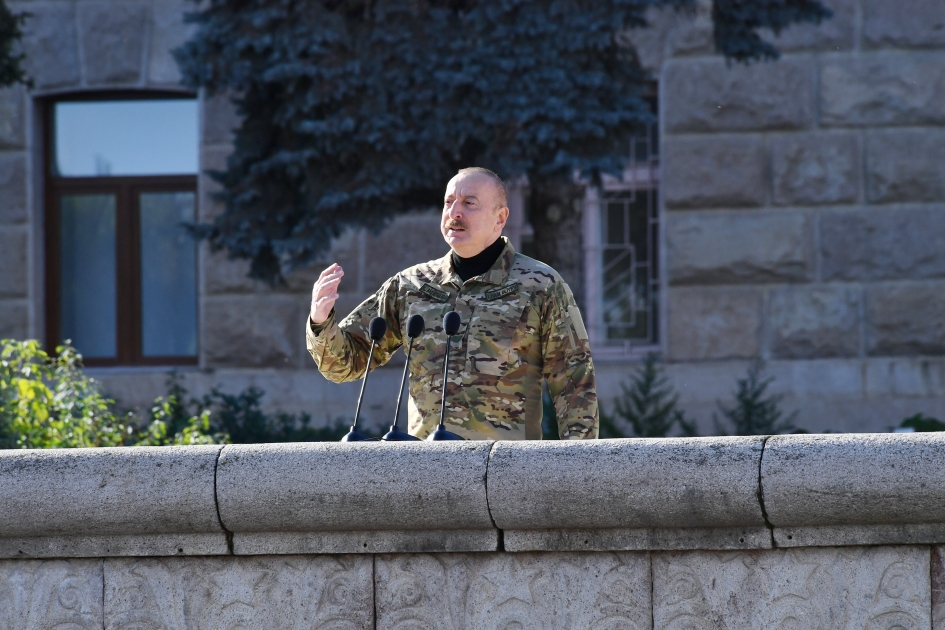
Aliyev at the parade in Khankendi
“If the Armenian leadership and some external forces behind it at that time and today had listened to my words, there would have been no need for a second Karabakh war,” Ilham Aliyev said, speaking at a military parade in Khankendi. “We do not need a new war. We have achieved what we wanted, restored international law, restored historical justice,” the Azerbaijani president added.
- The European Commission has recommended Georgia for candidate status, but what conditions have they set?
- More than 2 million tourists visited Armenia for the first time
- The process of closing “non-restricted” media outlets through courts has begun in Azerbaijan
A military parade dedicated to the third anniversary of the Azerbaijani army’s victory in the Second Karabakh War was held in Khankendi on November 8. Azerbaijani President Ilham Aliyev spoke at the parade.
Azerbaijan holds Victory Parade in Khankendi
This is the first Victory Day parade to be held in Karabakh
“Historic Event.”
Speaking about the victory of the Azerbaijani army in the second Karabakh war, Ilham Aliyev called it a “historic event”:
“Three years ago, the town of Shusha, which is the crown of Karabakh, was liberated from the occupants. A day after that, the enemy army surrendered and raised the white flag. Thus, the second Karabakh war ended with the complete victory of the Azerbaijani state. This is a historical event”.
He also recalled the period preceding the 44-day war and the ongoing negotiations between Azerbaijan and Armenia mediated by the OSCE Minsk Group:
“When I started my activity as president twenty years ago, I told my dear people that we should be ready to liberate our lands militarily. At that time, there was still some hope for peace negotiations. But over the years, those hopes have waned.
Armenia did not want to leave our lands willingly. The mediators engaged in the settlement of the Armenian-Azerbaijani conflict actually tried to freeze the situation. They believed that the Azerbaijani people would accept the situation. But the Azerbaijani people never thought to put up with this situation.
If the leadership of Armenia and some external forces, which at that time and today are behind it, had listened to my words, there would have been no need for a second Karabakh war. I have repeatedly said, addressing the leadership of Armenia: If you do not leave our lands, you will face us face to face on the battlefield, and whoever is behind you will not be able to make us turn from our just path. The 44-day Patriotic War has shown this once again”.
Three of the five principles of the peace treaty have been agreed upon. What about the rest? Views from Baku
According to the political observer, “the other two principles complement the agreed three, but do not replace them”
“Suspending the war was a deliberate choice we made.”
In his speech, Aliyev touched upon the suspension of the second Karabakh war after the liberation of Shusha:
“After the Shusha victory, the enemy was actually ready to capitulate and signed the capitulation act a day later. And we stopped the war. At that time our armed forces were one step away from Khankendi. Stopping the war at that time was our conscious choice. The fact that we are holding a military parade here today in the central square of the city of Khankendi shows once again how right and wise it was.
The end of the 44-day war on November 10, 2020 allowed us to return Aghdam, Kyalbajar and Lachin districts without a single shot. This was part of the surrender act signed by Armenia and our demand. Armenia was forced to fulfill this demand.
The liberation of Aghdam, Lachin, Kyalbajar districts without a single shot saved the lives of thousands of our young people. We would have liberated these districts on the battlefield in any case. However, the number of our shehids could have been greater”.
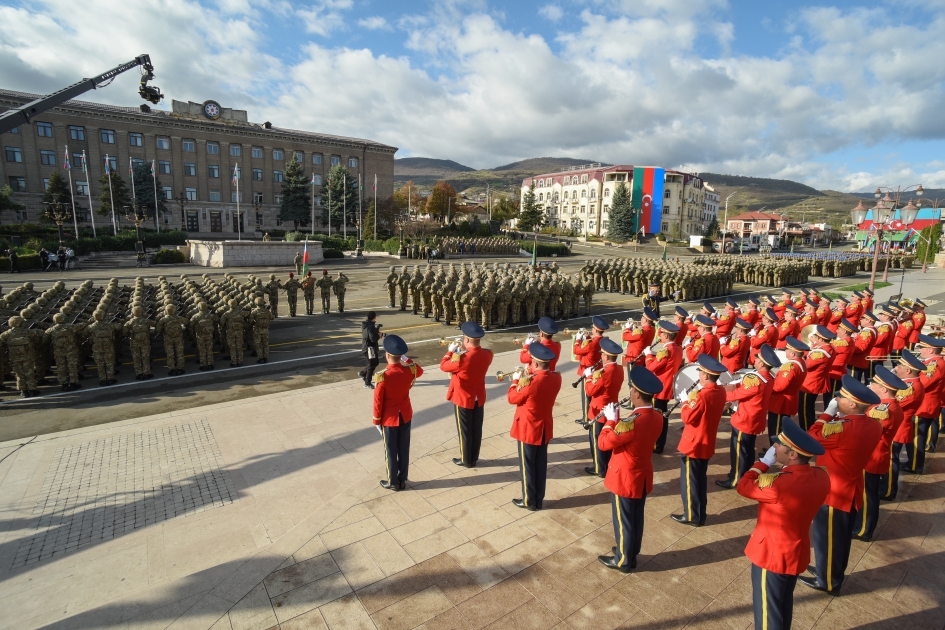 Military parade in Hankendi. November 8, 2023. Photo: AzərTAc
Military parade in Hankendi. November 8, 2023. Photo: AzərTAc
“From now on, we’re not to be trifled with.”
“We have gradually improved our positions on the border, and as a result of various measures we have the most favorable positions on most of the Azerbaijani-Armenian border. Why did we do this? Because we knew that revanchist forces were raising their heads in Armenia. We knew that the foreign forces behind Armenia and inciting it to act against us would again give it provocative signals. Therefore, we had to protect our border, and as a result of several military operations, today the situation on the Azerbaijani-Armenian border is under our control. At the same time, several military operations conducted in the Karabakh region created conditions for us to seize favorable heights in this region as well. At the same time, these operations were also a signal to the political leadership of Armenia: you must fulfill all the provisions enshrined in the surrender act, first of all, withdraw your armed forces from Karabakh, that is your obligation. But in reality we have seen the opposite. Not only did Armenia not withdraw its armed forces, on the contrary, more forces were sent in. At that time, the Lachin-Khankendi road was not yet under our control, weapons, ammunition, mines were transferred, and the political leadership of Armenia was unwilling to withdraw its armed forces from Karabakh.
What do the US and EU want in the South Caucasus? View from Baku
Experts of the South Caucasus Analytical Center (CSSC) analyzed the regional policy of the United States and the European Union
The military operations conducted over the past three years, including the Farrukh operation, the Sarybaba-Girkhgyz operation and others, have significantly improved our strategic position. These operations at the same time were messages to Armenia that no one and nothing can stop us, Karabakh is Azerbaijani land, we dictate the conditions here and you should immediately withdraw your armed forces from our lands. If they had listened to my words then, there would have been no need to hold anti-terrorist activities in September. The cause of all their troubles is themselves.
Four years ago, the Armenian Prime Minister, speaking at the Khankendi stadium across the street, arrogantly said: “Karabakh is Armenia, period.” By shedding blood and taking casualties on the battlefield, we showed him, those like him, and those behind them, that he was on the wrong track. We showed that Karabakh is Azerbaijan by fighting, fighting, fighting no matter what, and today everyone should know that from now on we are not to be trifled with. If the leadership of Armenia is still living with revanchist ideas, if the countries that are used to manipulation and are behind Armenia are still making some insidious plans against Azerbaijan, then let them look at today’s parade,” the Azerbaijani President continued his speech.
“We don’t need another war.”
Aliyev emphasized that Azerbaijan has achieved its goals and does not want a new war:
“We do not need a new war. We have achieved what we wanted, restored international law, restored historical justice, restored our national dignity and showed the enemy his place. The enemy kneeled before us, and today I am speaking here before the victorious Armed Forces of Azerbaijan. That is, we have fulfilled all the tasks. But at the same time, issues related to the construction of the army will remain one of the priorities for us. Let everyone know it and let no one forget it”.
The post Ilham Aliyev: “We do not need a new war” first appeared on The South Caucasus News.
The post Ilham Aliyev: “We do not need a new war” first appeared on The News And Times Information Network – The News And Times.


 image/jpeg
image/jpeg 